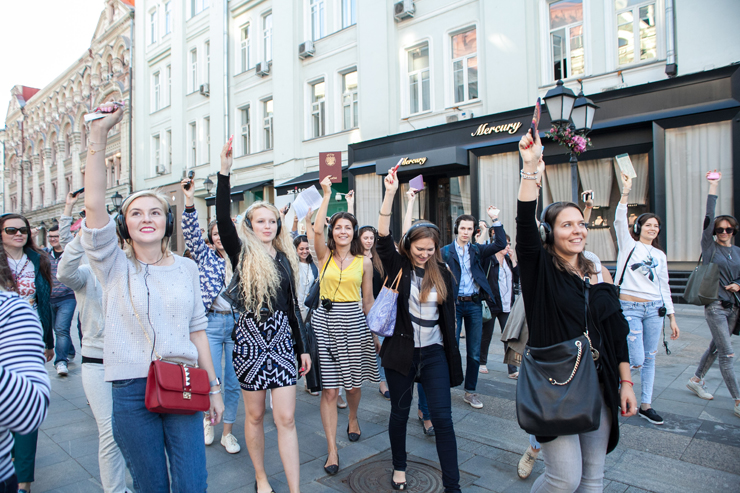
It starts out with a bang. As any proper Miamian will say, literally. Thunder rolls ominously from beyond. In many ways, it is the perfect backdrop to the setting: late afternoon, Miami City Cemetery. The horde huddles in thin yellow ponchos provided to us graciously by Galia, of Remote Miami. We wait for Mother Nature to bless us once more with our livelihood: thee, blessed sun. As any proper Miamian can testify, it is only a matter of minutes before the temperamental weather passes overhead. Heather, our AI (artificial intelligence) guide, waits patiently, too.
The concept behind Remote Miami is an exciting one; it’s an “interactive, pedestrian-based live art play experience.” In short, it’s a walking tour of the city with a theatrical and technological twist. Each group is comprised of no more than 50 participants. There is a human guide, Galiya, who for the most part is another participant like the rest of the group, and an artificial one, Heather.
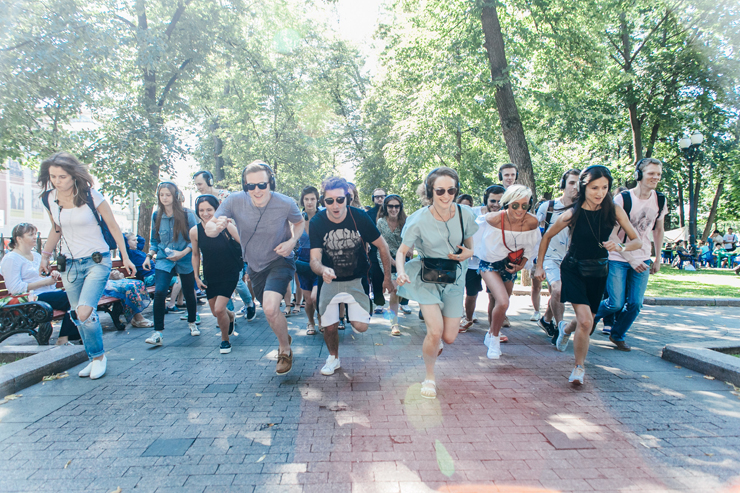
Heather is the conductor of the orchestra. Each participant wears headphones through which she speaks. It is both a shared experience and a very individual one, and one that has also played out in other cities across the world: Berlin, Milano, São Paulo, Moscow, Paris. Miami is their latest venue. By “their” I mean the creative forces behind Remote Miami: Rimini Protokoll (Kaegi/Karrenbauer) and Questalive Productions.
Earlier when I wrote “Heather waits patiently” is of course, to personify. She is, after all, just a voice. She matter-of-factly explains at the beginning of the experience, that she has no mouth, no lips, no tongue, and no body. She will also have us trust her. And we do, at least I do, because I am smart enough to know that her words echo the words of the creators of the spectacle (I use the word spectacle purposely, and you will find out later why). And if the creators want Remote Miami to take off, killing off your participants is bad business, by all accounts.
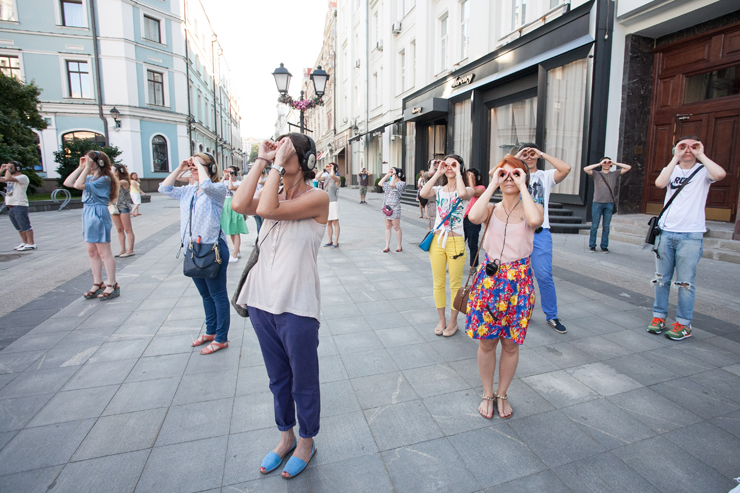
Needless to say, I will not trust blindly.
Heather asks us to take in our surroundings at the cemetery and pay close attention to nature. Trees, bushes, shrubbery, grass, birds perched on tree branches, weeds growing all over, roots breaking ground, cracking tombstones. She tells us that all this “nature” is there by design, and by that, she means human design. There is nothing natural about it, she argues.
- She argues. I catch myself wincing. Uncanny valley?
- Is it that deeply embedded fear and repulsion towards that, which pretends to be human, and isn’t, nor will ever be?
I think about the dust that was once bones that once comprised a human body that once housed a soul. I think about the ritual around death. We do not simply throw the dead out on the river, to rot, without ceremony. We dress them up, lay them on silken sheets wearing their best attire, and choose a spot for eternal solitude. There are various ways, of course, but there’s always something sacred about it. Does it matter if human hands place trees, shrubberies, and bushes over them, if not to honor them, and offer a bit of shade as the mourner mourns?
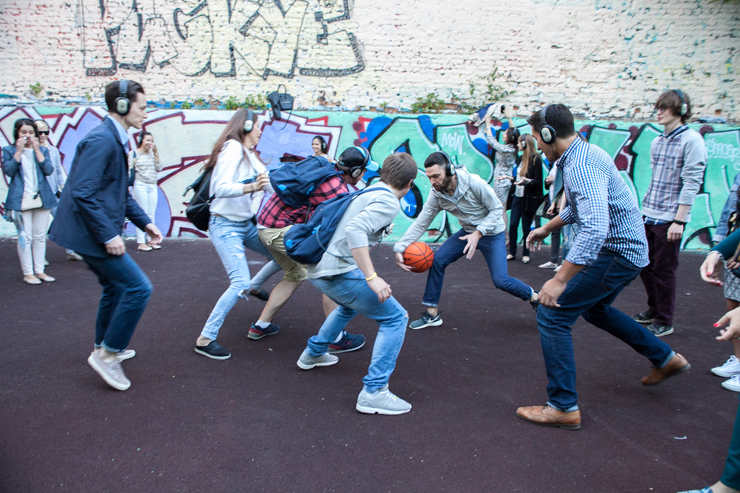
I wonder much. I trust the voice behind Heather.
Remote Miami is a unique human experience. It is a metaphor for some important truth; perhaps that technology has permeated our society so thoroughly, the next stage of human interaction simplyhas to happen via technology. Movie theaters are scarcely packed as they once were; moving from our couches when we have the delight of streaming media, makes the task monumental at times.It is apparent everywhere the eye can see: people with earphones tucked safely in, eyes unmoving, watching a woman with a Chewbacca mask laugh infectiously, or stalking someone via Instagram.
The sky can rip above us, Zeus himself can make a cameo from Mt. Olympus, and cafecito cubano can drip deliciously from the heavens, yet people would notice it only through the lens of their cameraphone.
The ancient Grecian actors have been long dead, after all, silence filling their stages.
As our group snakes through Miami’s underbelly, we perform all kinds of activities whereby the laymen regard us with certain trepidation. They are apprehensive at first, then amused, then effectively over it. They watch us bop our heads to the beat of a lifting song, and sigh in relief as we literally jump out of the MetroMover. Our eyes scan the heavy Miami sky. Heather says nothing, and our hearts ache forour smartphones, where they are burning a hole through our pockets. There is a glitch in the system; we are not allowed.
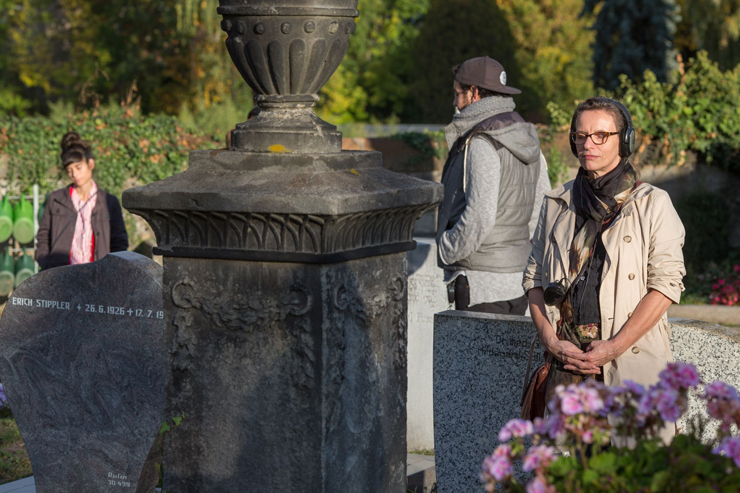
The significance behind Remote Miami could then be to re-focus humanity on what is truly substantial. There, in front of us, each other, passing the other by without saying hello. There, in front of us, the sidewalk. Did you ever notice the way weed grows defiantly in the concrete wild? There, in front of us, life. Did you realize you are a very gifted actor yourself?
We walk across a field of grass, which no one has ever traversed probably, and stop at a house covered top to bottom in black and white photographs of people with an index finger over their lips. They seem familiar but not of them are.
Which one would you like to be friends with? Heather inquires. I frown. The question I would ask is, “Why ask to remain in silence? Were we not given vocal cords if not to use them?”
I am sometimes awed by Heather, at other times frustrated by her, and yet other times, I appreciate what she is trying to accomplish. Miami is a wonderful city to explore, and I would say there was a lot more that could be done to make Remote Miami stand out even more. It seemed too safe to walk on the sidewalk, after all, since that is what it is made for. What about having us perform a song in front of everyone? What about taking us to a café and ordering a latte for someone else? What about something truly, well, crazy?
I hoped for more in Remote Miami. It could have been the limiting script. Miami is fun, and its people tend to be fun, too. But it’s definitely a good start. It’s definitely a step in the right direction to have us open our eyes to the live action happening right in front of us.
Remote Miami shows run on a weekly schedule every Saturday through June 25. General admission tickets are $32 and student tickets are $22 (valid Student I.D. must be shown at event on-site registration). Participants are encouraged to interact on social pages including Facebook (@RemoteMiami), Instagram(@RemoteMiami) and Twitter (@RemoteMiami) using the hashtags #RemoteMiami #AItakeover
 MAIN MENU
MAIN MENU

